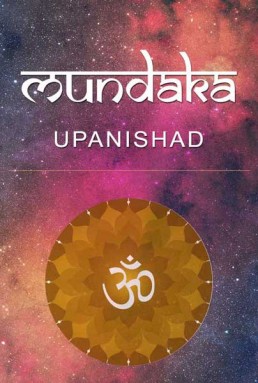द्वे विद्ये वेदितव्ये इति ह स्म
यद्ब्रह्मविदो वदन्ति परा चैवापरा च ॥ ४॥
dve vidye veditavye iti ha sma
yadbrahmavido vadanti parā caivāparā ca .. 4..
Mundaka Upanishad Introduction
Mundaka Upanishad Invocation
Mundaka 1 – Chapter 1 – Verse 1
Mundaka 1 – Chapter 1 – Verse 2
Mundaka 1 – Chapter 1 – Verse 3
Mundaka 1 – Chapter 1 – Verse 4
Mundaka 1 – Chapter 1 – Verse 5
Mundaka 1 – Chapter 1 – Verse 6
Mundaka 1 – Chapter 1 – Verse 7
Mundaka 1 – Chapter 1 – Verse 8
Mundaka 1 – Chapter 1 – Verse 9
Mundaka 1 – Chapter 2 – Verse 1
Mundaka 1 – Chapter 2 – Verse 2
Mundaka 1 – Chapter 2 – Verse 3
Mundaka 1 – Chapter 2 – Verse 4
Mundaka 1 – Chapter 2 – Verse 5
Mundaka 1 – Chapter 2 – Verse 6
Mundaka 1 – Chapter 2 – Verse 7
Mundaka 1 – Chapter 2 – Verse 8
Mundaka 1 – Chapter 2 – Verse 9
Mundaka 1 – Chapter 2 – Verse 10
Mundaka 1 – Chapter 2 – Verse 11
Mundaka 1 – Chapter 2 – Verse 12
Mundaka 1 – Chapter 2 – Verse 13
Mundaka 2 – Chapter 1 – Verse 1
Mundaka 2 – Chapter 1 – Verse 2
Mundaka 2 – Chapter 1 – Verse 3
Mundaka 2 – Chapter 1 – Verse 4
Mundaka 2 – Chapter 1 – Verse 5
Mundaka 2 – Chapter 1 – Verse 6
Mundaka 2 – Chapter 1 – Verse 7
Mundaka 2 – Chapter 1 – Verse 8
Mundaka 2 – Chapter 1 – Verse 9
Mundaka 2 – Chapter 2 – Verse 10
Mundaka 2 – Chapter 2 – Verse 1
Mundaka 2 – Chapter 2 – Verse 2
Mundaka 2 – Chapter 2 – Verse 3
Mundaka 2 – Chapter 2 – Verse 4
Mundaka 2 – Chapter 2 – Verse 5
Mundaka 2 – Chapter 2 – Verse 6
Mundaka 2 – Chapter 2 – Verse 7
Mundaka 2 – Chapter 2 – Verse 8
Mundaka 2 – Chapter 2 – Verse 9
Mundaka 2 – Chapter 2 – Verse 10
Mundaka 2 – Chapter 2 – Verse 11
Mundaka 3 – Chapter 1 – Verse 1
Mundaka 3 – Chapter 1 – Verse 2
Mundaka 3 – Chapter 1 – Verse 3
Mundaka 3 – Chapter 1 – Verse 4
Mundaka 3 – Chapter 1 – Verse 5
Mundaka 3 – Chapter 1 – Verse 6
Mundaka 3 – Chapter 1 – Verse 7
Mundaka 3 – Chapter 1 – Verse 8
Mundaka 3 – Chapter 1 – Verse 9
Mundaka 3 – Chapter 1 – Verse 10
Mundaka 3 – Chapter 2 – Verse 1
Mundaka 3 – Chapter 2 – Verse 2
Mundaka 3 – Chapter 2 – Verse 3
Mundaka 3 – Chapter 2 – Verse 4
Mundaka 3 – Chapter 2 – Verse 5
Mundaka 3 – Chapter 2 – Verse 6
Mundaka 3 – Chapter 2 – Verse 7
Mundaka 3 – Chapter 2 – Verse 8
Mundaka 3 – Chapter 2 – Verse 9
Mundaka 3 – Chapter 2 – Verse 10
Mundaka 3 – Chapter 2 – Verse 11
Mundaka 3 – Chapter 2 – Verse 12

Sri Shankara’s Commentary (Bhashya) translated by S. Sitarama Sastri
Com.—Angiras said to Saunaka. What did he say? (He said) that there were two sorts of knowledge to he known. So indeed, do those who know the import of the Vedas and who see the absolute truth, say what these two sorts are; he says: Para is the knowledge of the Paramatman and Apara is that which deals with the means and the results of good and bad actions. It may be asked how, having to say what it was that Saunaka asked about in the question—“What being known one becomes omniscient,’ Angiras stated what he was not asked about, by the passage “there are two sorts of knowledge, etc.” This is no fault; for the reply requires this order of statement. Apara vidya is ignorance and that ought to be dispelled. When what is known is Apara vidya, i.e., the subject of ignorance, nothing can be known as it is. The rule is that after thus refuting the faulty theory, the true conclusion should be stated.
Mundaka Upanishad – Verse 4 – Mundaka-1-1-4-tasmai sa – In Sanskrit with English Transliteration, Meaning and Commentary by Adi Shankaracharya (Sankara Bhashya) – Mundaka-1-1-4
